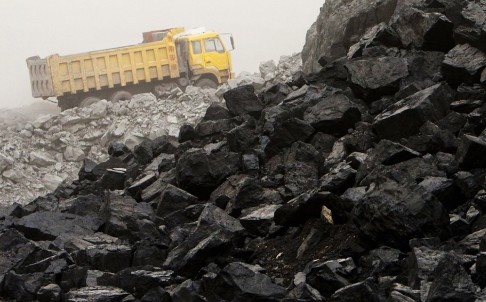China's coking coal imports rose 41 per cent last year to 75.4 million tonnes as they replaced domestic product. Photo: Bloomberg
Mongolian Mining, the nation's largest miner of coking coal sold primarily to China, expects the steel smelting ingredient's price to remain weak this year due to oversupply, although it has gained market share from rivals by expanding processing and logistics operations.
"I don't expect prices to fall below current levels, but I don't see meaningful price gain either, until demand and supply equilibrium is restored," chief executive Battsengel Gotov told a press conference.
I don’t see [price rises] until [there is] demand and supply equilibrium
He said prices of seaborne coking coal - mainly from Aus- tralia and Brazil - have been trading around the US$85 per tonne mark since the start of the year.
Mongolian Mining's average selling price of its mainstay product, hard coking coal, fell 15 per cent last year to US$92.10 a tonne from US$108.40 in 2012, owing to an estimated excess supply of over 30 million tonnes.
The excess is expected to fall to between 10 million and 15 million tonnes this year, helped partly by higher steel output in Europe and the United States, Gotov said.
The mainland's steel production growth is expected to slow to 4 per cent from 7.5 per cent last year as Beijing seeks to shift the economic growth driver from fixed-asset investment to consumption and services, according to the China Iron and Steel Association.
Mongolian Mining yesterday posted a net loss of US$58.1 million for last year, from US$2.5 million in 2012 as finance costs almost doubled to US$95.1 million.
Revenue fell 7.8 per cent to US$437.3 million as the 15 per cent fall in the average selling price offset a 26 per cent jump in hard coking coal sales volume to 4.3 million tonnes. The firm aims to sell six million tonnes this year.
The company's share price slid 7.9 per cent to 82 HK cents yesterday after the results.
Although the mainland's coking coal imports jumped 41 per cent last year to 75.4 million tonnes as low-cost imports replaced domestic products, Mongolia's share of the Chinese market fell to 20.4 per cent from 35.7 per cent while that of Australia surged to 40 per cent from 26.2 per cent.
Land-locked Mongolia's competitiveness is expected to be constrained until a government-built railway is completed next year or later, while Australian miners ramp up output to lower per-tonne fixed costs.
Source:South China Morning Post








0 comments:
Post a Comment